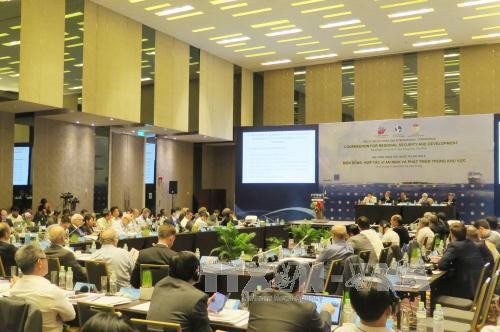(VOVworld) - The eighth International Conference on the East Sea, internationally called the South China Sea, concluded in the central coastal city of Nha Trang, Khanh Hoa province on Tuesday.
Participants at the conference, themed "Cooperation for Regional Security and Development", discussed recent developments in the East Sea, the historical, legal, economic, political, and security aspects of disputes there as well as mechanisms for tension management in the region.
They rejected the so-called nine-dash line claimed by China in the East Sea due to the lack of legal and scientific foundations. They said in fact China is maintaining, and has even increased, its presence and control in the East Sea including on the Scarborough and Vietnam’s Truong Sa (Spratly) Archipelagos. China’s continued construction of facilities and installation of equipment for military and reconnaissance purposes in the Fiery Cross, Mischief, and Subi Reefs have proved that China hasn’t changed its long-term goal of gaining entire control of the East Sea. This is a reason leading to rising tensions in the region. Participants called on regional countries to promote ASEAN’s central role in the management of disputes in the East Sea.
 |
| The fourth session of the 8th East Sea conference (Photo: Tiên Minh/VNA) |
They agreed that to maintain security and stability in the East Sea, parties involved should practice self-restraint, maintain the status quo and avoid unilateral action including militarization or declaring an Air Defense Identification Zone. Experts also proposed cooperation models in the East Sea including bilateral or tripartite mechanisms and building a code of conduct to prevent unexpected collisions at sea. Director the Diplomatic Academy of Vietnam Nguyen Vu Tung said the situation in the East Sea will likely be influenced by complicated developments in different regions in the world. He added that parties should deploy a constructive approach, respect each other and honor international law.
Michael McDevitt, a retired rear admiral of the US Navy and Senior Fellow of the Strategic Studies Program, the US Center for Naval Analyses, told reporters on the sidelines of the conference that the East Sea situation in the near future will be basically stable.
Associate Professor Nguyen Thi Lan Anh, Deputy Director of the East Sea Maritime Institute of the Diplomatic Academy of Vietnam, said the ruling of the Permanent Court of Arbitration in the Philippines’ lawsuit against China’s claims in the East Sea identified disputed areas in the region. The decision opened up the prospect of a peaceful settlement and management of the East Sea within the current rule-based order, and inspired other parties to consider various ways to settle East Sea disputes through peaceful means.
Dr. Vladimir Evseev, Deputy Director of Russia’s Institute of Commonwealth Countries, said any territorial dispute should be resolved by peaceful measures in line with international law. The settlement is not to identify a winner but to build a stable regional security system, he added.